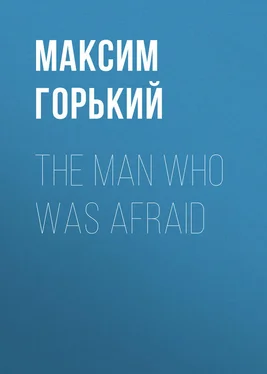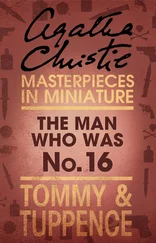Максим Горький - The Man Who Was Afraid
Здесь есть возможность читать онлайн «Максим Горький - The Man Who Was Afraid» — ознакомительный отрывок электронной книги совершенно бесплатно, а после прочтения отрывка купить полную версию. В некоторых случаях можно слушать аудио, скачать через торрент в формате fb2 и присутствует краткое содержание. Жанр: Русская классическая проза, Классическая проза, на английском языке. Описание произведения, (предисловие) а так же отзывы посетителей доступны на портале библиотеки ЛибКат.
- Название:The Man Who Was Afraid
- Автор:
- Жанр:
- Год:неизвестен
- ISBN:нет данных
- Рейтинг книги:5 / 5. Голосов: 1
-
Избранное:Добавить в избранное
- Отзывы:
-
Ваша оценка:
- 100
- 1
- 2
- 3
- 4
- 5
The Man Who Was Afraid: краткое содержание, описание и аннотация
Предлагаем к чтению аннотацию, описание, краткое содержание или предисловие (зависит от того, что написал сам автор книги «The Man Who Was Afraid»). Если вы не нашли необходимую информацию о книге — напишите в комментариях, мы постараемся отыскать её.
The Man Who Was Afraid — читать онлайн ознакомительный отрывок
Ниже представлен текст книги, разбитый по страницам. Система сохранения места последней прочитанной страницы, позволяет с удобством читать онлайн бесплатно книгу «The Man Who Was Afraid», без необходимости каждый раз заново искать на чём Вы остановились. Поставьте закладку, и сможете в любой момент перейти на страницу, на которой закончили чтение.
Интервал:
Закладка:
“Yes, a big sum,” said Foma, after a moment’s thought.
“Ah, ha!”
“But my father has much money. Why do you make such a fuss about it?”
Yakov Tarasovich was taken aback. He looked into the youth’s face with contempt and asked him in a faint voice:
“And you speak like this?”
“I? Who then?”
“You lie! It is your young foolishness that speaks. Yes! And my old foolishness – brought to test a million times by life – says that you are a young dog as yet, and it is too early for you to bark in a basso.”
Foma hearing this, had often been quite provoked by his godfather’s too picturesque language.
Mayakin always spoke to him more roughly than his father, but now the youth felt very much offended by the old man and said to him reservedly, but firmly:
“You had better not abuse me without reflection, for I am no longer a small child.”
“Come, come!” exclaimed Mayakin, mockingly lifting his eyebrows and squinting.
This roused Foma’s indignation. He looked full into the old man’s eyes and articulated with emphasis:
“And I am telling you that I don’t want to hear any more of that undeserved abuse of yours. Enough!”
“Mm! So-o! Pardon me.”
Yakov Tarasovich closed his eyes, chewed a little with his lips, and, turning aside from his godson, kept silent for awhile. The carriage turned into a narrow street, and, noticing from afar the roof of his house, Foma involuntarily moved forward. At the same time Mayakin asked him with a roguish and gentle smile:
“Foma! Tell me – on whom you have sharpened your teeth? Eh?”
“Why, are they sharp?” asked Foma, pleased with the manner in which Mayakin now regarded him.
“Pretty good. That’s good, dear. That’s very good! Your father and I were afraid lest you should be a laggard. Well, have you learned to drink vodka?”
“I drank it.”
“Rather too soon! Did you drink much of it?”
“Why much?”
“Does it taste good?”
“Not very.”
“So. Never mind, all this is not so bad. Only you are too outspoken. You are ready to confess all your sins to each and every pope that comes along. You must consider it isn’t always necessary to do that. Sometimes by keeping silent you both please people and commit no sins. Yes. A man’s tongue is very seldom sober. Here we are. See, your father does not know that you have arrived. Is he home yet, I wonder?”
He was at home: his loud, somewhat hoarse laughter was heard from the open windows of the rooms. The noise of the carriage, which stopped at the house, caused Ignat to look out of the window, and at the sight of his son he cried out with joy:
“Ah! You’ve come.”
After a while he pressed Foma to his breast with one hand, and, pressing the palm of his other hand against his son’s forehead, thus bending his head back, he looked into his face with beaming eyes and spoke contentedly:
“You are sunburnt. You’ve grown strong. You’re a fine fellow! Madame! How’s my son? Isn’t he fine?”
“Not bad looking,” a gentle, silver voice was heard. Foma glanced from behind his father’s shoulder and noticed that a slender woman with magnificent fair hair was sitting in the front corner of the room, resting her elbows on the table; her dark eyes, her thin eyebrows and plump, red lips strikingly defined on her pale face. Behind her armchair stood a large philodendron-plant whose big, figured leaves were hanging down in the air over her little golden head.
“How do you do, Sophya Pavlovna,” said Mayakin, tenderly, approaching her with his hand outstretched. “What, are you still collecting contributions from poor people like us?”
Foma bowed to her mutely, not hearing her answer to Mayakin, nor what his father was saying to him. The lady stared at him steadfastly and smiled to him affably and serenely. Her childlike figure, clothed in some kind of dark fabric, was almost blended with the crimson stuff of the armchair, while her wavy, golden hair and her pale face shone against the dark background. Sitting there in the corner, beneath the green leaves, she looked at once like a flower, and like an ikon.
“See, Sophya Pavlovna, how he is staring at you. An eagle, eh?” said Ignat.
Her eyes became narrower, a faint blush leaped to her cheeks, and she burst into laughter. It sounded like the tinkling of a little silver bell. And she immediately arose, saying:
“I wouldn’t disturb you. Good-bye!”
When she went past Foma noiselessly, the scent of perfume came to him, and he noticed that her eyes were dark blue, and her eyebrows almost black.
“The sly rogue glided away,” said Mayakin in a low voice, angrily looking after her.
“Well, tell us how was the trip? Have you squandered much money?” roared Ignat, pushing his son into the same armchair where Medinskaya had been sitting awhile before. Foma looked at him askance and seated himself in another chair.
“Isn’t she a beautiful young woman, eh?” said Mayakin, smiling, feeling Foma with his cunning eyes. “If you keep on gaping at her she will eat away all your insides.”
Foma shuddered for some reason or other, and, saying nothing in reply, began to tell his father about the journey in a matter-of-fact tone. But Ignat interrupted him:
“Wait, I’ll ask for some cognac.”
“And you are keeping on drinking all the time, they say,” said Foma, disapprovingly.
Ignat glanced at his son with surprise and curiosity, and asked:
“Is this the way to speak to your father?”
Foma became confused and lowered his head.
“That’s it!” said Ignat, kind-heartedly, and ordered cognac to be brought to him.
Mayakin, winking his eyes, looked at the Gordyeeffs, sighed, bid them good-bye, and, after inviting them to have tea with him in his raspberry garden in the evening, went away.
“Where is Aunt Anfisa?” asked Foma, feeling that now, being alone with his father, he was somewhat ill at ease.
“She went to the cloister. Well, tell me, and I will have some cognac.”
Foma told his father all about his affairs in a few minutes and he concluded his story with a frank confession:
“I have spent much money on myself.”
“How much?”
“About six hundred roubles.”
“In six weeks! That’s a good deal. I see as a clerk you’re too expensive for me. Where have you squandered it all?”
“I gave away three hundred puds of grain.”
“To whom? How?”
Foma told him all about it.
“Hm! Well, that’s all right!” Ignat approved. “That’s to show what stuff we are made of. That’s clear enough – for the father’s honour – for the honour of the firm. And there is no loss either, because that gives a good reputation. And that, my dear, is the very best signboard for a business. Well, what else?”
“And then, I somehow spent more.”
“Speak frankly. It’s not the money that I am asking you about – I just want to know how you lived there,” insisted Ignat, regarding his son attentively and sternly.
“I was eating, drinking.” Foma did not give in, bending his head morosely and confusedly.
“Drinking vodka?”
“Vodka, too.”
“Ah! So. Isn’t it rather too soon?”
“Ask Yefim whether I ever drank enough to be intoxicated.”
“Why should I ask Yefim? You must tell me everything yourself. So you are drinking? I don’t like it.”
“But I can get along without drinking.”
“Come, come! Do you want some cognac?”
Foma looked at his father and smiled broadly. And his father answered him with a kindly smile:
“Eh, you. Devil! Drink, but look out – know your business. What can you do? A drunkard will sleep himself sober, a fool – never. Let us understand this much at least, for our own consolation. And did you have a good time with girls, too? Be frank! Are you afraid that I will beat you, or what?”
Читать дальшеИнтервал:
Закладка:
Похожие книги на «The Man Who Was Afraid»
Представляем Вашему вниманию похожие книги на «The Man Who Was Afraid» списком для выбора. Мы отобрали схожую по названию и смыслу литературу в надежде предоставить читателям больше вариантов отыскать новые, интересные, ещё непрочитанные произведения.
Обсуждение, отзывы о книге «The Man Who Was Afraid» и просто собственные мнения читателей. Оставьте ваши комментарии, напишите, что Вы думаете о произведении, его смысле или главных героях. Укажите что конкретно понравилось, а что нет, и почему Вы так считаете.












